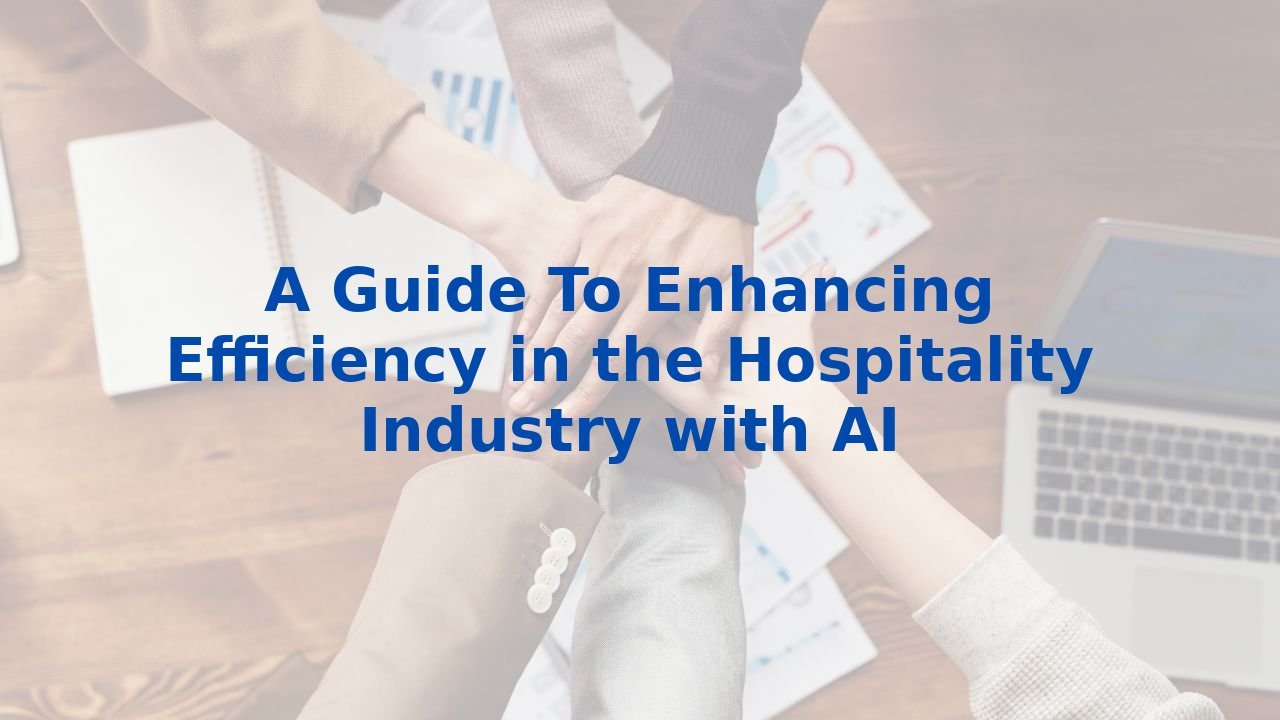A Guide To Enhancing Efficiency in the Hospitality Industry with AI
A Guide To Enhancing Efficiency in the Hospitality Industry with AI
Introduction
The hospitality industry stands as a pillar of human interaction, filled with rich experiences and lasting memories. In this dynamic and competitive landscape, maintaining high service quality and customer satisfaction is not just a goal; it’s a necessity. Enter artificial intelligence (AI), a transformative force capable of pioneering efficiency across various facets of hotel management, event planning, and customer service. This guide will delve into the general business processes in the hospitality industry and illustrate how AI can serve as a catalyst for improving these processes, showcasing the multitude of benefits it can deliver.
Business Processes in the Hospitality Industry
Customer Satisfaction and Guest Experience
At the heart of every hospitality business lies an unwavering commitment to guest satisfaction. AI empowers establishments by personalizing the guest experience through the detailed analysis of data from past stays and individual preferences. Imagine a guest arriving and being greeted with their favorite beverage, just because the system already knows!
Event Planning
Planning an event can often feel like juggling flaming torches. AI alleviates this challenge by streamlining multiple tasks—suggesting venues based on past successful events, optimizing timelines, and even predicting what guests might enjoy, thus transforming a frantic planning process into a well-orchestrated affair.
Cost Control
In a world where profitability is paramount, AI stands out as an ally in managing costs. It can scrutinize historical data, predict future expenses, and highlight areas ripe for cost reduction, ultimately enhancing financial health without compromising service quality.
Team Management
A motivated and well-managed team is essential for seamless operations. AI facilitates this by assisting in employee scheduling, performance monitoring, and revealing insightful dynamics within team interactions—all vital for fostering a cohesive work environment.
Health and Safety
In an era where health standards are non-negotiable, AI can play a pivotal role in monitoring compliance with safety protocols. By detecting potential hazards and issuing real-time alerts, AI helps ensure that both guests and staff remain safe and secure.
Occupancy Rates
Maintaining optimal occupancy rates is crucial to any hospitality enterprise. AI excels in analyzing market trends and predicting demand, enabling organizations to make informed decisions about room pricing and availability.
Crisis Management
Preparedness is key when it comes to handling crises, be it natural disasters or system failures. AI aids organizations in formulating contingency plans, predicting possible risks, and facilitating swift responses to minimize disruptions.
Service Quality
High-quality service is the lifeblood of customer satisfaction. AI can continuously monitor service standards, identify areas for improvement, and deliver constructive feedback to staff, reinforcing a culture of excellence.
How AI Enhances Efficiency
Automation of Routine Tasks
AI’s capacity to automate mundane tasks, like the check-in/check-out process, room assignments, and even billing, liberates staff to focus their talents where they’re needed most—building relationships and enhancing guest experiences.
Data Analysis
Amidst the deluge of data generated in hospitality, AI excels at quickly analyzing information, extracting valuable insights that may escape human observation—including customer feedback and operational metrics.
Predictive Analytics
AI’s predictive capabilities can reshape strategic decision-making. By forecasting occupancy rates and identifying potential maintenance issues, organizations can proactively address challenges, thus safeguarding operational continuity.
Personalization
Each guest is unique, and AI recognizes this by tailoring experiences to individual preferences and behaviors, promoting a deeper connection and increasing the likelihood of repeat visits—a win-win.
Enhanced Customer Service
With AI-powered chatbots available around the clock, customer queries can be resolved swiftly, which not only boosts guest satisfaction but also reduces the burden on human staff, allowing them to concentrate on complex scenarios.
Benefits of Training Employees for AI
Improved Collaboration
When employees are equipped with AI knowledge, it paves the way for cross-departmental collaboration. A unified understanding of AI strategies can foster a seamless workflow, ultimately benefiting the organization as a whole.
Enhanced Problem-Solving Skills
Training employees in the intricacies of AI empowers them to tackle complex issues with greater efficacy and creativity, fostering a robust problem-solving environment.
Adaptability
As AI continues to evolve, so too must the workforce. Educating employees on AI ensures swift adaptation to new tools and processes, positioning the organization ahead of the competition.
Ethical Considerations
With power comes responsibility. Training employees on the ethical implications of AI ensures the responsible use of technology, safeguarding compliance with industry standards.
Conclusion
The integration of AI technologies within the hospitality industry heralds a new era of operational efficiency and improved performance. By automating routine tasks, leveraging data analytics, predicting trends, personalizing guest experiences, and enhancing customer service, AI stands as a revolutionary force. Add to this the importance of employee training, and we see a holistic approach to embracing innovation that not only keeps organizations competitive but also enriches the guest experience time and time again.



